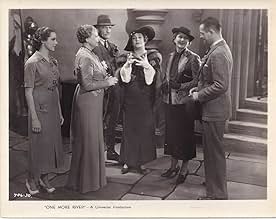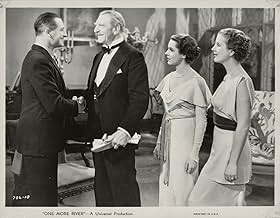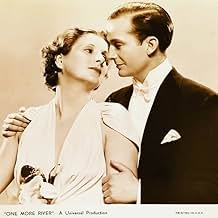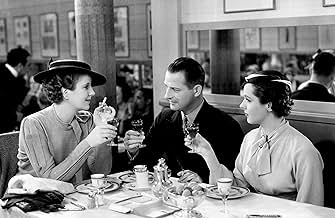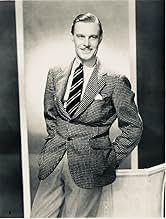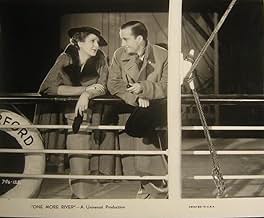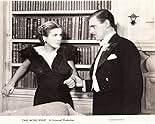Füge eine Handlung in deiner Sprache hinzuA young lady leaves her brutal husband and meets another man aboard a ship.A young lady leaves her brutal husband and meets another man aboard a ship.A young lady leaves her brutal husband and meets another man aboard a ship.
- Regie
- Drehbuch
- Hauptbesetzung
Empfohlene Bewertungen
Today, 1930s director James Whale is best remembered for "Frankenstein", "The Invisible Man", and "The Bride of Frankenstein", as well as for being probably the only openly gay person in cinema at the time (Ian McKellen played him in 1998's "Gods and Monsters"). Lesser known are Whale's dramas. There was "Waterloo Bridge", about a relationship strained by World War I, and "One More River", about a woman who flees an abusive marriage and hooks up with someone else. Not something usually depicted back then, so I wonder if it would've even been possible once the Hays Code went into effect the following year.
It's not a masterpiece, but passable. I find these fetishistic looks at the British ruling class weird (especially considering Whale's dirt-poor childhood). I suppose that nowadays, such a movie - whether focusing on the working class or ruling class - would probably come from Pedro Almodovar. Diana Wynyard, Jane Wyatt, Colin Clive (Dr. Frankenstein in Whale's more famous movies) and Frank Lawton all turn in fine performances.
It's not a masterpiece, but passable. I find these fetishistic looks at the British ruling class weird (especially considering Whale's dirt-poor childhood). I suppose that nowadays, such a movie - whether focusing on the working class or ruling class - would probably come from Pedro Almodovar. Diana Wynyard, Jane Wyatt, Colin Clive (Dr. Frankenstein in Whale's more famous movies) and Frank Lawton all turn in fine performances.
I enjoyed this film, but must be nearly alone in not particularly finding Diana Wynyard appealing in any real way, in her role as the unhappy, abused wife. Jane Wyatt on the other hand, as her sister, is sophisticated and lovely, very Myrna Loy.
Having read lots of books set in Edwardian England, I am familiar with the often ludicrous plots involved in setting up divorces and cases of criminal conversation. If you accept that the laws were limited and often ridiculous, you can overlook what seems so old-fashioned.
It is amusing to see Mrs. Patrick Campbell in action; she is a grand ham. The part of the abusive husband is a stereotype; he is oily and creepy and cruel. The new love is the opposite of course, charming and kind and gentle.
Overall a well-made film; just wish it had been made a year earlier before the draconian production code took over.
Having read lots of books set in Edwardian England, I am familiar with the often ludicrous plots involved in setting up divorces and cases of criminal conversation. If you accept that the laws were limited and often ridiculous, you can overlook what seems so old-fashioned.
It is amusing to see Mrs. Patrick Campbell in action; she is a grand ham. The part of the abusive husband is a stereotype; he is oily and creepy and cruel. The new love is the opposite of course, charming and kind and gentle.
Overall a well-made film; just wish it had been made a year earlier before the draconian production code took over.
Saw this as part of Cinefest 2009 in Syracuse, and it was a revelation. Not that it doesn't stir high expectations: a Galsworthy novel, adapted by playwright R.C. Sheriff (author of the great antiwar play "Journey's End"), directed with great assurance by James Whale, and with a near-amazing cast. As an abused high society wife trying to wrench free of her extremely nasty husband, Diana Wynyard is ladylike and touching. A very young Jane Wyatt is her confidante, Henry Stephenson is a helpful lawyer relative, and Frank Lawton is the appealing young man who falls in love with her. All are upstaged by Mrs. Patrick Campbell, a formidable presence bellowing every line with relish, and she It's remarkably adult for its day, with a modern attitude about adultery (our heroine doesn't, but the movie seems to believe she should). It's literate and fast-moving, and sandwiched between Whale's "The Invisible Man" and "The Bride of Frankenstein," it's one of several examples of how assured he was outside of the horror genre.
"One More River" (1934) stars Diana Wynyard, Frank Lawton, Colin Clive as top-liners, but the rest of the cast is stellar! Mrs. Patrick Campbell, C. Aubrey Smith, Jane Wyatt, Reginald Denny, Henry Stephenson, Lionel Atwill, Alan Mowbray, Kathleen Howard, Gilbert Emery, E. E. Clive, and the list just keeps on going. This Universal Studios produced film will have most thinking it was made in England, as most of the stars and even the sets are about as English as can be. Beautifully appointed and directed by James Whale, just after coming off of "The Invisible Man" and just prior to "Bride of Frankenstein", this was more of a diversion for Whale, yet he handles it with major aplomb. Many today will consider the theme of suit for divorce based on adultery rather tame, and this would have had even more of a jolt in 1934 had the Code not just gone into effect, but the finished product still has the ability to hold our attention. Wynyard had just come off of her nomination for Best Actress Oscar for "Cavalcade", but she's much better here, and her quiet, if not elegant, though stolid performance serves the part well. She's matched by the ruthless, somewhat fey, but catty nastiness of her film husband, Colin Clive, in a part that shows he had genuine talent that captured range. Frank Lawton, who passionately loves Wynyard, and who is accused of being the co-respondent in the case against Wynyard, is less well-suited, but effective enough.
Written by John Galsworthy, this was much more potent when first released as a novel, but Whale has whittled the novel down to 88 minutes of film, and he's done it very effectively. The film is talkative, but its pristine presentation still packs a punch. Gorgeous cinematography, good direction, fine acting all around - this is recommended highly actually, though many today will wonder what all the hoopla is about. In effect, the film is now dated, and because it lacks the buzz-buzz of so much activity on screen, the CGI, the crash and bang of today's typical hit, let's say it will play better to those looking for something, not cerebral, but soap-operaish in an old-fashioned way.
Written by John Galsworthy, this was much more potent when first released as a novel, but Whale has whittled the novel down to 88 minutes of film, and he's done it very effectively. The film is talkative, but its pristine presentation still packs a punch. Gorgeous cinematography, good direction, fine acting all around - this is recommended highly actually, though many today will wonder what all the hoopla is about. In effect, the film is now dated, and because it lacks the buzz-buzz of so much activity on screen, the CGI, the crash and bang of today's typical hit, let's say it will play better to those looking for something, not cerebral, but soap-operaish in an old-fashioned way.
James Whale was known for his horror movies, including 1931's "Frankenstein," 1932's "The Old Dark House," and 1933's "The Invisible Man." As a former stage director, Whale harkened back to his live theatre days and tackled a subject that some considered foreboden in August 1934's "One More River," a film released just before his 1935's "The Bride of Frankenstein."
The adaptation of the John Galsworthy 1933's novel of the same name, Whale's "One More River" was the first to aggressively test the new Production Code Administration (PCA), led by Joseph Breen. A movie on a husband's sadism towards his wife in the middle of an abusive marriage could have passed the censors in the Pre-Code era, but was taboo during the Breen reign. Whale and his associates had difficulty getting the jest of Galsworthy's themes passed by the Hays Office that ran the PCA. But Whale subtly unfolded "One More River's" more unsavory moments that can be picked up by the observant viewer. Clare (Diana Wynyard) had decided to leave her abusive husband, Sir Gerald Corven (Colin Clive), and her home in Sri Lanka. On the way back to England on an ocean liner, Clare meets a sympathetic young man, Tony Croom (Frank Lawton). Her jealous husband discovers the platonic relationship between the two and tries to get even with her in a highly-publicized domestic trial.
Film historian William Everson labeled "One River More" Whale's masterpiece. "It is by far Hollywood's most successful attempt at putting any subject of England on the screen, not even excepting Cavalcade," he wrote. "It represents the fullest flowering of Whale's unique, richly theatrical yet wholly cinematic style."
Universal Pictures persuaded England's superstar lady of the stage, Mrs. Patrick Campbell, to play Lady Mont, a friend of Clare's, in one of her a handful of movies she appeared. Playwright George Bernard Shaw was a huge fan of Mrs. Campbell, and was so inspired by her acting he based a number of his plays on her. One work was Eliza Doolittle in his 1913 "Pygmalion," later remade into the stage musical and movie "My Fair Lady." Even though she was married, the two had a close friendship, which, judging by the letters he wrote to her, Shaw wanted their relationship to be even closer. Campbell, by all accounts, wasn't exactly enamored about being on the screen. The actress quipped about love making being shown to all by famously saying, "My dear, I don't care what they do, so long as they don't do it in the street and frighten the horses." Mrs. Campbell first arrived on the set requesting from Whales, "I would like to look like a woman called '(Greta) Garbo." When she saw her character on the screen, she retorted, "I look like a little chest of drawers."
"One More River" is also known as Jane Wyatt's film debut. The New Jersey-born and Manhattan-raised daughter of an investment banker, Wyatt possessed a love for the stage, attending apprentice school at the Berkshire Playhouse in Stockbridge, Massachusetts. Wyatt easily made the transition from the Broadway stage to Hollywood as Dinny Charwell, sister of Clare. Famous for her appearances in films such as Frank Capra's 1937 "Lost Horizon" and 1947's "Gentleman's Agreement," she ran into a buzzsaw during the McCarthy hearings with her outspoken defense of the senator's targets. She is most remembered as Margaret Anderson in television's 'Father Knows Best' series.
"One More River" was a mediocre performer at the box office and has since been relegated just to those studying director Whale's body of work. But as historian William Everson noted, "Perhaps more than any other film currently available, it deserves 'Rediscovery.' "
The adaptation of the John Galsworthy 1933's novel of the same name, Whale's "One More River" was the first to aggressively test the new Production Code Administration (PCA), led by Joseph Breen. A movie on a husband's sadism towards his wife in the middle of an abusive marriage could have passed the censors in the Pre-Code era, but was taboo during the Breen reign. Whale and his associates had difficulty getting the jest of Galsworthy's themes passed by the Hays Office that ran the PCA. But Whale subtly unfolded "One More River's" more unsavory moments that can be picked up by the observant viewer. Clare (Diana Wynyard) had decided to leave her abusive husband, Sir Gerald Corven (Colin Clive), and her home in Sri Lanka. On the way back to England on an ocean liner, Clare meets a sympathetic young man, Tony Croom (Frank Lawton). Her jealous husband discovers the platonic relationship between the two and tries to get even with her in a highly-publicized domestic trial.
Film historian William Everson labeled "One River More" Whale's masterpiece. "It is by far Hollywood's most successful attempt at putting any subject of England on the screen, not even excepting Cavalcade," he wrote. "It represents the fullest flowering of Whale's unique, richly theatrical yet wholly cinematic style."
Universal Pictures persuaded England's superstar lady of the stage, Mrs. Patrick Campbell, to play Lady Mont, a friend of Clare's, in one of her a handful of movies she appeared. Playwright George Bernard Shaw was a huge fan of Mrs. Campbell, and was so inspired by her acting he based a number of his plays on her. One work was Eliza Doolittle in his 1913 "Pygmalion," later remade into the stage musical and movie "My Fair Lady." Even though she was married, the two had a close friendship, which, judging by the letters he wrote to her, Shaw wanted their relationship to be even closer. Campbell, by all accounts, wasn't exactly enamored about being on the screen. The actress quipped about love making being shown to all by famously saying, "My dear, I don't care what they do, so long as they don't do it in the street and frighten the horses." Mrs. Campbell first arrived on the set requesting from Whales, "I would like to look like a woman called '(Greta) Garbo." When she saw her character on the screen, she retorted, "I look like a little chest of drawers."
"One More River" is also known as Jane Wyatt's film debut. The New Jersey-born and Manhattan-raised daughter of an investment banker, Wyatt possessed a love for the stage, attending apprentice school at the Berkshire Playhouse in Stockbridge, Massachusetts. Wyatt easily made the transition from the Broadway stage to Hollywood as Dinny Charwell, sister of Clare. Famous for her appearances in films such as Frank Capra's 1937 "Lost Horizon" and 1947's "Gentleman's Agreement," she ran into a buzzsaw during the McCarthy hearings with her outspoken defense of the senator's targets. She is most remembered as Margaret Anderson in television's 'Father Knows Best' series.
"One More River" was a mediocre performer at the box office and has since been relegated just to those studying director Whale's body of work. But as historian William Everson noted, "Perhaps more than any other film currently available, it deserves 'Rediscovery.' "
Wusstest du schon
- WissenswertesAccording to Jane Wyatt, "[James Whale] was crazy about Mrs. Pat [Mrs. Patrick Campbell]. The set was kind of run for her. The whole thing was to get her relaxed. She was playing up a lot about how nervous she was, and I think she got an awful lot of attention that way. i think we felt sorry for Mrs. Campbell. Poor dear--how ever are they going to pull her together. That was my reaction. We all had to pull her together and help her through.
- PatzerIn the opening scene, the liner pulling into the London dock that lady Corven arrives on is seen in the establishing shot is clearly named the ORFORD, yet after a we see her and Tony speak on the deck, another establishing shot of the ship now shows it is one called the ORSOVA.
- VerbindungenReferenced in Gods and Monsters (1998)
Top-Auswahl
Melde dich zum Bewerten an und greife auf die Watchlist für personalisierte Empfehlungen zu.
Details
- Erscheinungsdatum
- Herkunftsland
- Sprache
- Auch bekannt als
- Över floden
- Drehorte
- Produktionsfirma
- Weitere beteiligte Unternehmen bei IMDbPro anzeigen
- Laufzeit1 Stunde 28 Minuten
- Farbe
- Seitenverhältnis
- 1.37 : 1
Zu dieser Seite beitragen
Bearbeitung vorschlagen oder fehlenden Inhalt hinzufügen

Oberste Lücke
By what name was One More River (1934) officially released in Canada in English?
Antwort
